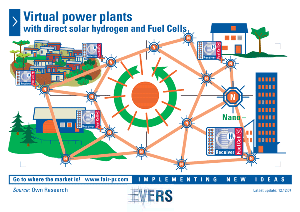Arno's EnergyIdeas (5)
About cause and effect in hydrogen and fuel cells ...
This is the fifth edition of "Arno's energy ideas" by Arno A. Evers, founder and long-time until 2006 organizer of the Group Exhibit "Hydrogen + Fuel Cells "at the annual HANNOVER FAIR in Germany since 1995. Until 2010, Evers and his team are worldwide active to speak, exhibit or participate in hydrogen and fuel cells congresses as ambassadors of the Group Exhibition, contracted by Deutsche Messe AG. All these activities are documented on the Internet and are updated regularly.
Around 90 percent of all global activities, according to my knowledge, in H2/FC-research and development (R&D), both in research institutes as well as at commercial companies, are currently addressing the issues of optimizing the reformation of fossil fuels like: petrol, diesel and kerosene), the improvement of water management in a direct methanol fuel cell (DMFC) and optimising the “balance of plant” for high-temperature fuel cells (SOFC). All of this correct and important, and I admire the work of each scientist and engineer, who is working these areas.

One possibility to produce hydrogen directly - without the use of electricity - is the direct use of solar energy, based on electrochemical photolysis
(Graphic: Arno A. Evers FAIR-PR) |
However, the question should be allowed: Are there not also other approaches possible? Why should we use fossil fuels or nuclear power for the production of hydrogen? Why should we continue to work on electrolyses, knowing the facts that electricity is firstly, not simply "coming out of the socket", but is generated at central power plants with very low efficiencies. Secondly, it is also known, that the so-called "renewable energies" (meaning in this context: electricity from wind and photovoltaic) is not "the golden bullet” for the production of hydrogen, as at this times, electrolysers simply prefer to work with non-fluctuating direct current (DC) optimally. Just as the use of legally prescribed 50 Hz alternating current (AC) causes high conversion losses in the electrolysis process.escribed 50 Hz alternating current (AC) causes high conversion losses in the electrolysis process.
However, there are activities, raising hope, e.g. those, focusing on in the direct production of hydrogen on the basis of algae, bacteria or specific new energy plants. Or, even better, activities working on the direct production of hydrogen with direct solar photo-chemically processes. And all this not just "small-small" on a laboratory scale, but decentralised and covering large areas with direct access for everyone and without supporting existing monopolies or even create new ones.
Who can achieve this goal? At the moment, I see no currently existing industry, which is prepared or willing to do so. But why can there not be new companies, with clever business models to achieve something which is not yet existing in the world today? The time is ripe - I am sure that the right people to do so are available and ready to go. Money is also not the decisive criterion, in the contrary: Longsighted private investors will soon see the worldwide energy opportunities with a sensitive hydrogen and fuel cells infrastructure and will secure their financing, based on the immense “return of investment” opportunities which are there.
That is my hope.
I am happy to start a dialogue on these and other "EnergyIdeas".
You can reach me at: arno@hydrogenambassadors.com
Date: 22.01.2008
Links:
https://www.hydrogenambassadors.com/background/facts.php#productionofh2
|
